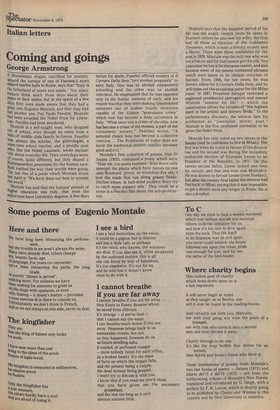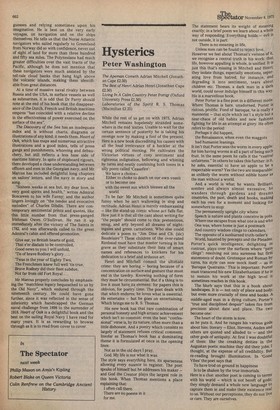Italian letters
Coming and goings
George Armstrong
A Mussolinian slogan, inscribed for eternity around the cornice of one of Fascism's more absurd marble halls in Rome, says that "Italy is the fatherland of poets and saints." Not many Italians think much these days about their Poets or their saints, but in the space of a few days they were made aware that they had a great one, Eugenio Montale, and that they had lost another one Pier Paolo Pasolini. Montale had been awarded the Nobel Prize for Literature. Pasolini had been murdered.
Montale is a self-taught man, who dropped out of school, even though he came from a well-off middle-class family in Genoa. Pasolini Was always the scholar, the glottologist, a some-time school teacher, and a prolific poet Who, like the Nobel Laureate, wrote exclusively about everyday life. Their everydays were, of course, quite different, but they shared a Kierkegaardian pessimism for the human race. Both loathed the way their worlds were going. The last line of a poem which Montale wrote last April is "We have done our best to worsen the world."
Montale has said that the Italians' pursuit of higher education was folly, that even the Police now have University degrees. A feW days before his death, Pasolini offered readers of II Corriere Della Sera "two modest proposals" to save Italy. One was to abolish compulsory schooling and the other was to abolish television. He emphasised that he was opposed only to the Italian versions of each, and his reason was,that they were making lobotomised monsters out of Italian youth, monsters capable of the Gidean "gratuitous crime" which now has become a daily occurence in Italy. "What once was a crime of the elite, now has become a crime of the masses, a part of our consumers' society," Pasolini wrote. "A personal choice now has become a collective coercion ... The Proletariat of today does not know the traditional interior conflict between good and evil."
Montale's first collection of poems, Ossi Di Seppia (1925), contained a poem which says, "Hear me, you poets laureate/ Who move only amongst the plants which have names no one uses/Boxwood, privet, or acanthus/For me, I love the roads that run along grassy fields! Ditches where, in half-dried puddles/Boys try to catch some slippery eels." That could be a scene in a Pasolini film about the sub-proletarlate. Montale says that the happiest period of his life was the nearly twenty years he spent in Florence (where he also met his wife), the first half of those as Director of the Gabinetto Vieusseux, which is both a literary society and a library. There were three candidates for the post in 1929. Montale was the only one who was not a fascist and for that reason got the job. Ten years later he lost it for the same reason, and also because some of his poems contained phrases which were taken to be oblique criticism of fascism. From 1948, for ten years, he was literary editor for II Corriere Della Sera, and he still types out the occasional piece for the Milan, paper. In 1967, President Saragat exercised a neglected presidential prerogative and named Montale "senator for life" — which the constitution allows for citizens of "the highest merit in the artistic and literary fields." In the parliamentary directory, the senator lists his profession as "journalist, writer, poet." Montale is the first professed journalist to be given the Nobel Prize.
Montale has only voted on two issues in the Senate (and he continues to live in Milan). The first was when he voted in favour of the divorce law and the second was during the incredibly protracted election of Giovanni Leone to be President of the Republic, in 1971. On the twenty-second ballot. Leone lacked one vote for victory, and that one vote was Montale's. He was known to favour Leone (over Fanfani), but after the twenty-first ballot the senator had fled back to Milan, saying that it was impossible to get a decent meal any longer in Rome. He is also a prophet.
guesses and relying sometimes upon his imagination. He is best on the very early voyages, on navigation and on the -ships themselves. He tells us that the Norse Atlantic navigators who sailed regularly to Greenland from Norway did so with confidence, never out of sight of land for more than three hundred and fifty sea miles. The Polynesians had much greater difficulties over the vast tracts of the Pacific, although he does not mention that these navigators were much assisted by the tell-tale cloud banks that hang high above the volcanic islands, making them identifiable from great distances.
At a time of massive naval rivalry between Russia and the USA, in surface vessels as well as submarines, it is odd that Dr Parry should note at the end of his book that the disappearance of the Dutch, French and British maritime empires "has coincided with a relative decline in the effectiveness of power exercised on the surface of the sea".
The Discovery of the Sea has an inadequate index and is without charts, diagrams or illustrations of any kind; it needs them. Heart of Oak, which has maps and numerous attractive illustrations and a good index, tells of press gangs and punishments, whoreing and debauchery, but still reflects a less base side of maritime history. In spite of shipboard rigours, there developed a close understanding between officers and men in the Georgian navy, and Mr Marcus has included delightful long chapters on sailors' letters, and the navy in story and song.
"Sixteen weeks at sea but, my dear love, in very good spirits and health," writes Admiral Boscawen to his wife Fanny; and the author lingers lovingly on "the tender and evocative melodies" of Charles Dibdin. There are contemporary sentimental prints and quotes, like this little number from that press-ganged Irishman Owen O'Sullivan. He ran it up immediately after the victory of The Saints in 1782, and was afterwards called to the great Admiral's cabin and offered promotion: Give ear, ye British hearts of gold, That e'er disdain to be controlled, Good news to you I will unfold, 'Tis of brave Rodney's glory ... 'Twas in the year of Eighty Two, The Frenchmen knew full well 'tis true, Brave Rodney did their fleet subdue, Not far from old Fort Royal ...
Mr Marcus properly concludes by emphasising the "matchless legacy bequeathed to us by the Old Navy", which endured through the nineteenth century. He could have gone further, since it was' reflected in the sense of inferiority which handicapped the German naval challenge from 1898 to the surrender of 1918. Heart of Oak is a delightful book and the best on the sailing Royal Navy I have read for many years. It is as rewarding to browse through as it is to read from cover to cover.

































 Previous page
Previous page